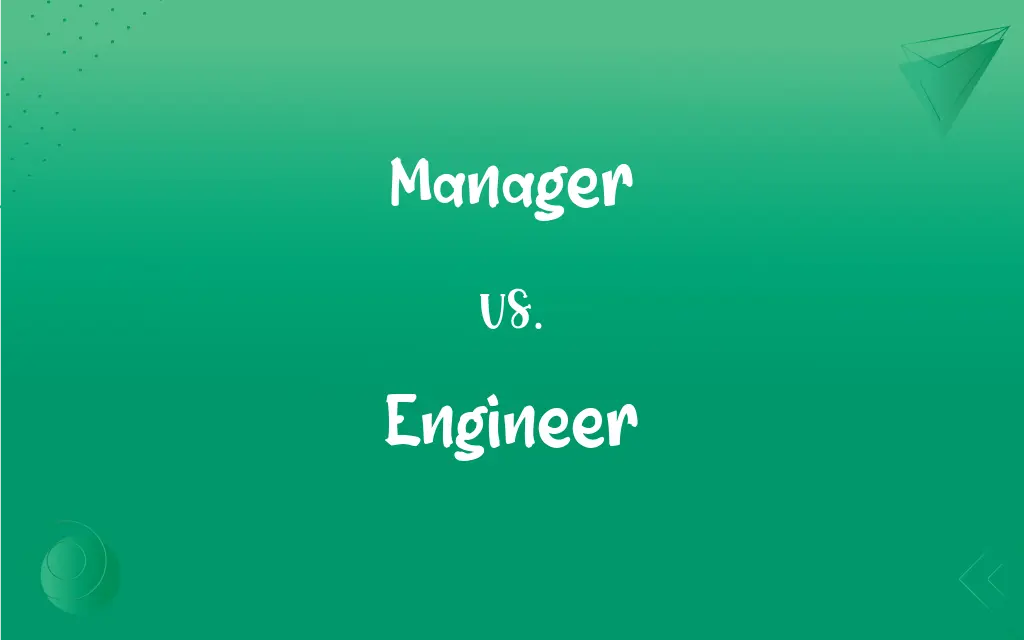Manager vs. Engineer: What's the Difference?
Edited by Aimie Carlson || By Harlon Moss || Published on February 9, 2024
A manager oversees and coordinates a team or project, focusing on organization and leadership, while an engineer applies scientific and mathematical principles to design and build solutions.

Key Differences
A manager is typically responsible for planning, leading, organizing, and controlling a team or project, focusing on achieving specific objectives. An engineer, however, is primarily concerned with applying technical knowledge to design, develop, and implement solutions or products.
Managers often play a key role in decision-making, resource allocation, and strategy implementation in an organization. Engineers, in contrast, concentrate on problem-solving, innovation, and technical proficiency in fields like mechanical, electrical, or software engineering.
The role of a manager can vary significantly across industries but generally involves people management, operational oversight, and meeting business goals. An engineer's role, while also varying by specialization, revolves around technical challenges, designing systems or processes, and ensuring functionality and efficiency.
Managers are essential for effective team dynamics, communication flow, and aligning individual efforts with organizational goals. Engineers, on the other hand, are critical for the technical development and innovation necessary for the advancement of technologies and industry standards.
A manager's focus is on leadership and organizational aspects, ensuring that teams and projects are guided towards successful outcomes. An engineer’s focus is more on the technical side, using specialized skills to create, build, and optimize systems or products.
ADVERTISEMENT
Comparison Chart
Primary Focus
Leadership, organization, and coordination
Technical expertise in design and innovation
Key Responsibilities
Team management, strategic planning
Designing, building, and problem-solving
Role in Organization
Decision-making, resource allocation
Technical development, implementation
Skill Set
Leadership, communication, strategic thinking
Technical skills, analytical thinking
Goal
Achieving business objectives, team efficiency
Developing functional and efficient systems
ADVERTISEMENT
Manager and Engineer Definitions
Manager
Focuses on organizational goals, team dynamics, and strategic planning.
As a manager, she played a crucial role in setting the team's strategy.
Engineer
A professional who applies scientific and mathematical principles to create and implement solutions.
The engineer designed a new software system to improve user experience.
Manager
Acts as a leader and communicator within an organization.
The manager effectively communicated the new policy changes to her team.
Engineer
Focuses on problem-solving, innovation, and technical proficiency.
The engineer solved the complex coding issue that was causing system failures.
Manager
A professional responsible for overseeing and coordinating a team or project.
The manager ensured that the project met its deadlines and stayed within budget.
Engineer
Applies technical knowledge to ensure functionality and efficiency.
The electrical engineer improved the circuit design for better energy efficiency.
Manager
Involved in decision-making, resource management, and problem resolution.
The manager had to make tough decisions to resolve the staffing issues.
Engineer
Involved in the design, development, and optimization of systems or products.
The civil engineer was instrumental in the structural design of the new bridge.
Manager
Strives to optimize team performance and achieve business targets.
The manager introduced new processes to improve team efficiency.
Engineer
Specializes in areas like mechanical, electrical, or software engineering.
As a mechanical engineer, he developed innovative designs for automotive parts.
Manager
One who directs a business or other enterprise.
Engineer
One who is trained or professionally engaged in a branch of engineering.
FAQs
What is the main role of a manager?
To oversee and coordinate teams or projects towards achieving specific goals.
What's a key difference in the focus of managers and engineers?
Managers focus on organizational and leadership aspects, while engineers focus on technical problem-solving and innovation.
What is a common educational background for managers?
Managers often have degrees in business administration, management, or related fields.
Can engineers become managers?
Yes, engineers can advance to managerial positions, often requiring additional skills in leadership and management.
What kind of education is required for engineers?
Engineers usually need a specialized degree in their specific field of engineering.
Are engineers limited to certain types of industries?
Engineers work in diverse industries, including technology, construction, manufacturing, and many others.
Can a person be both a manager and an engineer?
Yes, some professionals combine both roles, especially in smaller organizations or specific industries.
What industries do managers work in?
Managers work in a variety of industries, from technology and finance to healthcare and manufacturing.
What does an engineer do?
Engineers apply scientific and mathematical principles to design, develop, and implement technical solutions.
Do managers need technical skills?
While not primarily, having technical knowledge can be beneficial, especially in technical fields.
How do managers assess team performance?
Managers use various metrics and evaluations to assess team productivity and efficiency.
Can managers be involved in hiring decisions?
Yes, managers often participate in hiring and team-building processes.
Do engineers require certifications?
Some engineering fields require professional certifications or licensure.
Do engineers work in teams?
Yes, engineers often collaborate with other engineers and professionals in project teams.
Is ongoing education important for engineers?
Yes, engineers need to keep up with technological advancements and may pursue additional training or education.
Are communication skills important for both managers and engineers?
Yes, effective communication is crucial for both roles, albeit in different contexts.
Do managers directly involve themselves in product development like engineers?
Typically, no. Managers oversee the process, while engineers are directly involved in development.
How does a manager's role change with company size?
In larger companies, managers may have more specialized roles, while in smaller companies, they might wear multiple hats.
Is problem-solving a critical skill for engineers?
Absolutely, engineers often need to devise innovative solutions to technical challenges.
What's more important for a manager, technical or interpersonal skills?
Interpersonal and leadership skills are typically more crucial for managers.
About Author
Written by
Harlon MossHarlon is a seasoned quality moderator and accomplished content writer for Difference Wiki. An alumnus of the prestigious University of California, he earned his degree in Computer Science. Leveraging his academic background, Harlon brings a meticulous and informed perspective to his work, ensuring content accuracy and excellence.
Edited by
Aimie CarlsonAimie Carlson, holding a master's degree in English literature, is a fervent English language enthusiast. She lends her writing talents to Difference Wiki, a prominent website that specializes in comparisons, offering readers insightful analyses that both captivate and inform.








































































